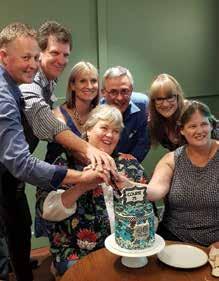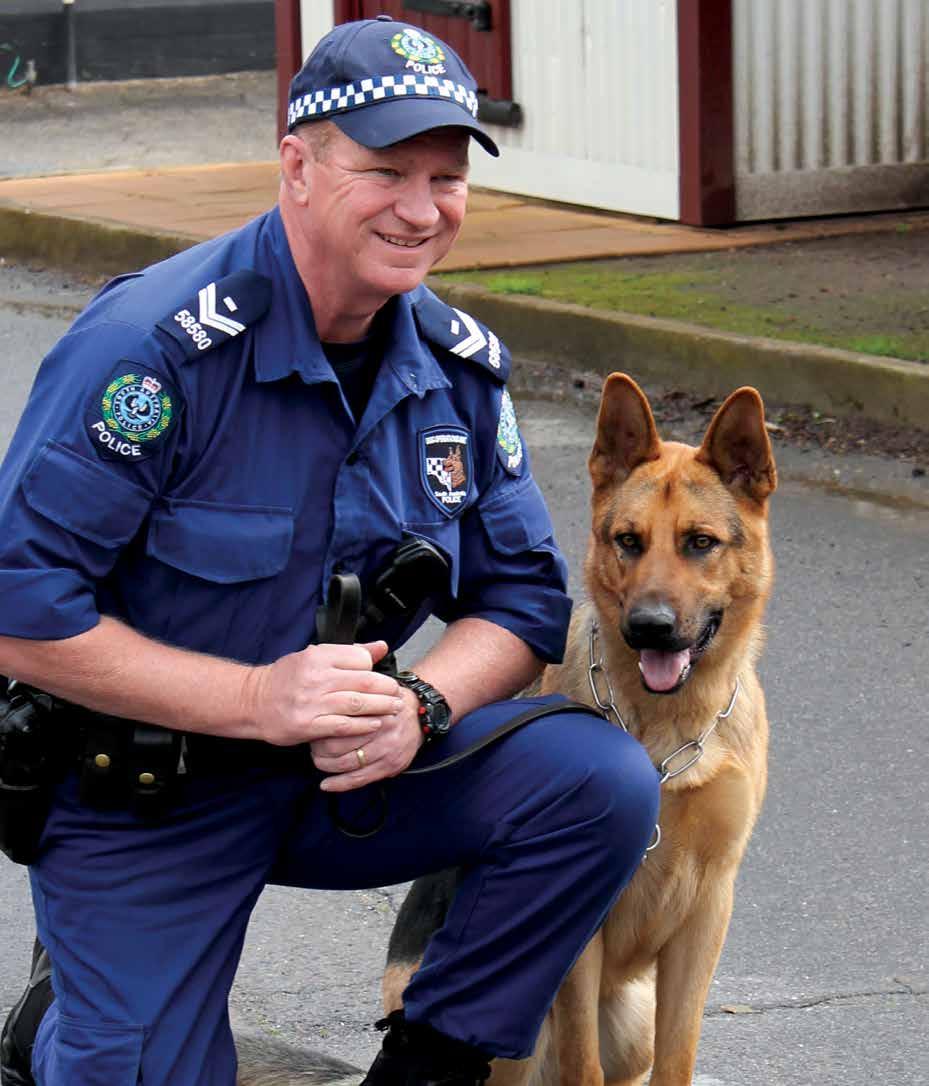
8 minute read
Letters
L
LETTERS
Letters to the editor can be sent by: Regular mail Police Journal, PO Box 6032, Halifax St, Adelaide SA 5000 Email editor@pasa.asn.au Internal dispatch Police Journal 168
Backing Police Association on APY Lands
Being a past member, from some 20 years back, I took some interest in the president’s editorial Abandon the model, not the APY Lands (Police Journal, February 2021).
I was a selected member to participate in the beginning of the police aide scheme at the end of 1986. Other members were Linc Gore, Mark Weaver and David Butt (deceased). If my memory serves me correctly, the organizer/selector was Sergeant “Twiggy” Phillips.
My position in the scheme was to man Fregon (Aprawattaja) police station and my aide was Munti Smith, a very capable, initiated gentleman.
My wife, Julie, and our two young daughters occupied a police-supplied home, which was near the site of a yet-to-be-constructed police station and cell.
Any, or all, of the members on that first experience would be willing to back up and even add to the argument on the position that the association is taking.
It has been a long time, but it was one of the most cherished positions I held, and the view is also that of my wife, who was employed in the community, and my now-grown-up daughters.
The memory of Munti and his family are still very precious in our minds and tears come easily when I remember Munti, a dear family friend, and our times together. Munti passed away several years after I was transferred out, as were the other members.
We met with the hierarchy of the police department to try to convince them that the scheme should go on and that we were all prepared to stay on.
But the response was that “we have run out of money” and that was the dominating factor in closing the scheme as it was. A very bad move for everybody.
If I can assist in your endeavour, please contact me.
Yours faithfully
Reimer “Bruno” Andt
P
PRESIDENT
Mark Carroll
Abandon the model, not the APY Lands
The proposed SAPOL APY Lands model is a lose-lose for police and the remote indigenous communities with which they have worked hard to build significant relationships.
The model relies on State Tactical Response Group members flying in and out to police communities on the lands.
It is a proposal which not only disadvantages the indigenous communities on the lands but will also become an industrial issue for Police Association members.
It situates these Adelaide-based members away from their homes and families for around 60 per cent of their total shifts.
By occupying permanent positions on the lands, police have always been able to gain critical knowledge of local communities, such as their family structures and the welfare issues indigenous people face in the area.
It is a system which has worked for many years and is critical for gaining trust with the local community members.
It is folly to underestimate the relationships police form with local communities. They provide the necessary trust for victims of crime to come forward and make reports.
10 Police Journal
The proposed FIFO model simply facilitates the abandonment of longestablished customs of community policing.
In fact, the Australian Law Reform Commission Inquiry into Indigenous Incarceration Rates highlighted that:
“… poor relations influence how often Aboriginal and Torres Straight Island people interact with police… poor police relations can contribute to disproportionate arrest, police custody and incarceration rates. ”
The association is firm in its position that SAPOL should: • Maintain permanent officers on the
APY Lands. • Undertake meaningful discussions with the association regarding any difficulties with the current model. • Actively work to fill long-standing vacant community constable positions. • Create permanent relief positions and train appropriate voluntary discrete personnel to relieve permanent members when absent from the
APY Lands.
SAPOL should not proceed with its new model. I have written to Commissioner Grant Stevens and informed the government of our position. Hindley Street
The SAPOL district policing model has not only abandoned Hindley St police officers but also put the community at risk.
The area has a colourful history and a reputation for trouble. But one thing partygoers in the precinct could count on was permanent foot patrols in Hindley St, Rundle St, Rundle Mall and the surrounding areas.
That kept these highly charged areas safe, especially during the peak periods on Friday and Saturday nights.
And the sight of uniformed officers on foot patrol provided a strong deterrent for those who sought to create trouble.
But under the district policing model, this staple of Adelaide policing is now a thing of the past.
Eastern District members, who service the area, tell me that at times there is not a single officer on foot patrol in Hindley St or the surrounding areas. Particularly Under the current model, Hindley St members can actually be called to jobs anywhere in the district. important That means is that we they might have to respond to jobs as far away as Unley or Parkside. have not sold It’s hard to believe that SAPOL could off any of implement a policing model devoid of permanent foot patrols in Hindley St. our existing The result is that the area and its conditions and surrounds are now an unsafe, out-of-control haven for anti-social behaviour, criminal entitlements to achieve activity and alcohol-fuelled violence. SAPOL must take responsibility, and be held accountable, for the abject failure of the outcome. its model insofar as it relates to the entertainment precinct.
It must: • Review the DPM model as it pertains to the Eastern District. • Provide permanent foot patrols in these high-risk city areas — across the full spectrum of shifts. • Increase the size of response patrol teams in the Eastern District and return them to the staffing levels that existed before the Stage 2 DPM rollout in
March 2020. The public will simply not continue to accept the extreme Hindley St violence we see on our nightly news bulletins. SAPOL must act in the interests of frontline police and the public they serve.
Enterprise AgreeementPolice Association members recently voted to accept the new enterprise agreement. It was an overwhelming endorsement — a 94 per cent “yes” vote — which confirmed my view that this was a strong agreement for our members. We obviously negotiated the agreement in an extremely challenging economic climate. Despite this, we have emerged with a package that benefits our members financially and provides them with improved working conditions. Particularly important is that we have not sold off any of our existing conditions and entitlements to achieve the outcome. This is actually a very significant — and often overlooked — aspect of enterprise bargaining. Amid the difficult economic circumstances, the government also negotiated in good faith and offered a package that provides greater flexibility arrangements for members. I acknowledge the significant contributions of association delegates and the committee of management in achieving this outcome. And, during the entire enterprise bargaining process, the efforts of Police Association assistant secretary Steve Whetton were outstanding.
EDITOR’S NOTE: At press time, SAPOL informed Police Association president Mark Carroll that it intends to provide a “permanent foot patrol presence” in Hindley and Rundle streets, Rundle Mall and “surrounding environs”.
February 2021 11
APY Lands model wrong for prosecution service
I share Police Association president Mark Carroll’s concerns around the proposed APY Lands operational model and respectfully add that prosecutorial aspects, such as the ability to provide timely, satisfactory PD90 responses and witness contact, should be considered.
The Lands FVIS does a wonderful job but I can envisage work outside of its crucial role being asked of it in the absence of in situ investigating officers.
APY prosecutions are presently being managed from PHQ. While proofing in person is preferable, the ability to consult and proof victims via AVL will be compromised without permanent operational positions on the Lands.
Should this model be implemented on the Lands and locations like Coober Pedy, Ceduna and Yalata, I believe our prosecution service delivery to these communities will be adversely affected.
Kind regards
Liz Corbett
Whyalla Prosecution Unit
Recruited 60 years ago
Thirty-eight young men joined the SA police department on Monday, February 20, 1961, followed by many others during that year. Sadly, six of our number have passed away.
We had an enjoyable reunion on Friday, February 19, 2021 to celebrate the passage of 60 years since joining.
For our training back in 1961, many did not commence straight away. We were in reserve and did odd jobs around the barracks as well as PT and drill.
The older guys commenced N Troop around April. Others then commenced cadet training in O, P and Q troops during the remainder of 1961.
Original cadet courses were of nine months’ duration which was then reduced to about seven-anda-half months.
The latter troops were the first trainees at Fort Largs.
A couple of years after cadet training, we returned to barracks to take our place in what was known as the adult course in which we were joined by adult recruits aged up to 29.
This was only four-and-a-half months’ duration. Our group would have trained in adult courses 89, 90, 91 or 92.
At the completion of the adult course, any members aged 20 or above were sworn in as probationary constables. The younger cadet members then waited until they turned 20 before being sworn in.
Many adults transitioned from civilian to trained police officer in four-and-a-half months. On-the-job training obviously played a major role.
The three-year cadet scheme was then established at Fort Largs. We referred to those in the scheme as “the new breed”.
Kind regards
Peter “Perc” White
Senior Sergeant (ret)
Shared experiences
Course 75 started at the now old police academy, Fort Largs, on January 8, 1981. Ten men and 10 women started a two-year cadet course. Eight men and 10 women graduated two years later, on December 8, 1982.
On January 8, 2021, the remaining seven members of course 75 who are still working in SAPOL got together to celebrate 40 years in the job.
The veterans got the chance to talk about the 40 years of shared experiences.
Bryan Whitehorn
Senior Constable First Class
Dog Operations Unit





